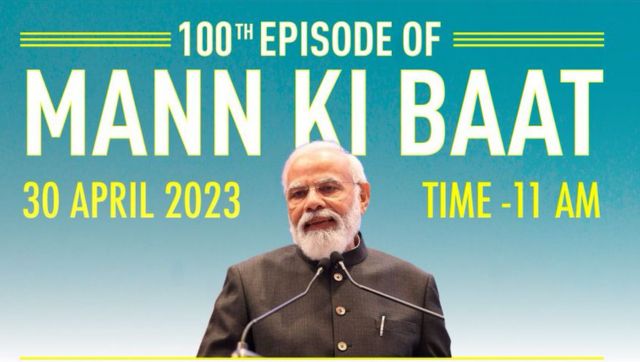Prime Minister Narendra Modi started his monthly radio programme ‘Mann Ki Baat’ back in October 2014. Its 100th episode will be aired on April 30. A brainchild of PM Modi, while ‘Mann Ki Baat’ started as a monologue, it evolved into a conversation, a dialogue, and went on to become a major medium of sharing positive stories from the lives of common people of India who are doing some exceptional work for the betterment of the nation. Over the years, the programme has covered myriad topics, ranging from weather, environment, cleanliness, culture and various ubiquitous social issues to even pressure of school examinations and anxiety of results. ‘Mann Ki Baat’ is now translated into 23 Indian languages and 29 dialects, some of which are even alive, thanks to the PM’s broadcast. Shashi Shekhar Vempati, ex-CEO of Prasar Bharati, says that when we look into the thought process of ‘Mann Ki Baat’, there is a continuum to it. In 2013, during the campaign for 2014 General Elections, Narendra Modi had floated the idea of creating a platform where people from all walks of life could contribute and get connected in the process. ‘Mann Ki Baat’ is an extension of that thought process where people get connected and share their stories. The departure from the past is the scale at which people are being connected. Now, this connection has its range throughout the country, invoking a mass behavioural change. This platform required a universal reach which has access to the lowest common denominator of the society. That’s where the role of radio becomes important since radio is the most affordable means where the poorest of the poor can be integrated into this dialogue process. That’s the reason why ‘Mann Ki Baat’ is widely heard across the length and breadth of the country. PM Modi himself underlined the seminal role of radio in one of the episodes of ‘Mann Ki Baat’. He shared a story wherein he was in Himachal Pradesh as state in-charge and stopped at a tea shop where he heard a breaking news on radio. That’s when he realised the importance of this medium. This may be why PM Modi chose radio as his medium to reach out to all Indians. Consequently, PM Modi has transformed the ‘Mann Ki Baat’ into a people’s movement. He has mentioned several hundred individuals, NGOs and institutions that are working on various themes, from cleanliness to running community libraries to rural entrepreneurship or Yoga, inspiring people. Like a chain reaction, the process of inspiration has continued further, with more and more people getting involved in such initiatives of their own accord. So, it has helped to build a mass movement with a multiplier effect across India. ‘Mann Ki Baat’ has also served as a medium to highlight hitherto neglected topics which were imparted urgency and currency as a result of being taken up by the prime minister. In one of the episodes, PM Modi talked about tribal culture and the centrality of water for them; in yet another episode it was the girl child and the importance of ‘Beti Bachao Beti Padhao’. Going further, he talked about the vanishing art forms and culture in India, taking up the example of a musical instrument and the artistes using those instruments. A most important aspect has been PM Modi’s focus on India languages. Not just that ‘Mann Ki Baat’ is currently translated into 23 Indian languages and 29 dialects, the PM uses quotes from the languages spoken in different parts of the country, which has contributed in conserving these, otherwise dying, languages. An example of this is a dialect called ‘Ranglong’ which does not have a script, but now efforts are being made to keep this language alive. PM Modi also mentioned an Assamese dictionary in Brail, called ‘Himkosh’. There have been several highpoints of this journey. Conversation with legendary singer Lata Mangeshkar and with former US President Barack Obama in ‘Mann Ki Baat’ were exceptionally moving. Meanwhile, the most important perspective of Mann Ki Baat has been to spread positivity through good news across the country. In each episode there is something positive to look up to and the message that every Indian can be the agent of change. As a result of it, several television broadcasts, including some private news channels, started segments of good news. We wish ‘Mann Ki Baat @100’ to share more such success stories and keep inspiring the nation forever. Read all the Latest News , Trending News , Cricket News , Bollywood News , India News and Entertainment News here. Follow us on Facebook, Twitter and Instagram.
‘Mann Ki Baat’ is now translated into 23 Indian languages and 29 dialects, some of which are even alive, thanks to the PM’s broadcast
Advertisement
End of Article


)

)
)
)
)
)
)
)
)



